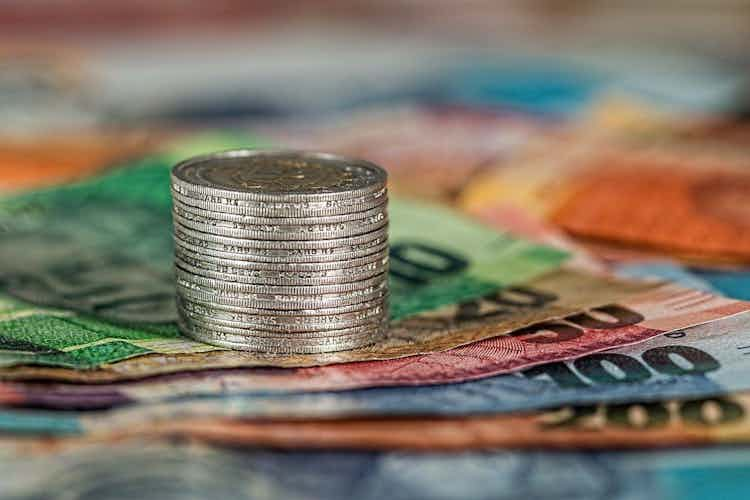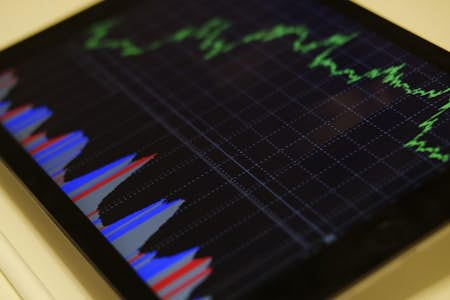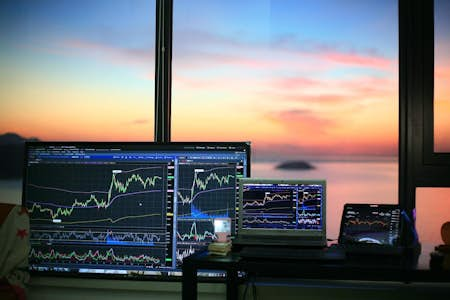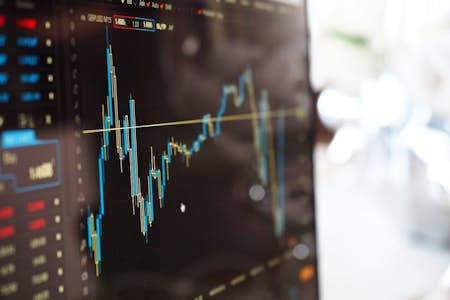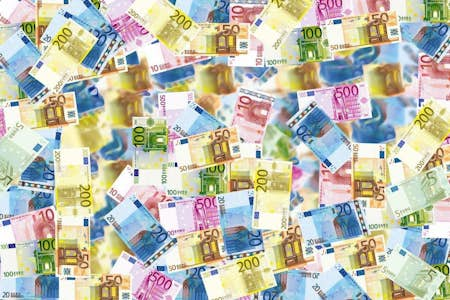Forex trading has become increasingly popular for retail investors thanks to the proliferation of online trading platforms. They have made it possible for anyone to buy more than just the common Euro or Dollar. Instead, Japanese Yen (JPY), New Zealand Dollars (NZD) and the Swiss franc (CHF) are now all trading options available to anyone. Plus, as the best online trading platforms are regulated by the Financial Conduct Authority (FCA), Forex is not something you should immediately disregard as for the experts only.
But what exactly is Forex trading? How does it work? And will it make you money? Read on to learn everything you need to know about Forex trading.
Discover the UK's leading investment platforms, whatever your investment goals. Click on a provider below to get started!
What is Forex trading?
Forex trading is the act of exchanging one currency for another. The term Forex is a shortening of the longer phrase Foreign Exchange. The term is typically used to describe the exchange of significant sums of one currency for another. While exchanging foreign currency to go on holiday is technically speaking Forex trading, the term is usually reserved for those looking to make money out of those exchanges instead of buying it for purely practical reasons.
How does Forex trading work?
Forex traders can make returns in a couple of ways.
Arbitrage
Arbitrage is when a Forex trader spots a disparity in exchange rates when changing one currency for another and then another. Given the number of countries and currencies globally, exchange rates mean currencies are often worth differing amounts in different locations. When traders identify instances of that occurring, that is where returns can be made. It is essentially free money.
Arbitrage is perhaps most easily understood using an example. Please note that the following example uses highly simplified and hypothetical figures that are not reflective of the market.
Imagine you are a British investor. You look at the current exchange rates and see that 10 Euros are worth 7 British Pounds, your base currency.
Imagine, also, that at that moment in time, the market is exchanging British Pounds at parity with US Dollars so that 7 British Pounds is worth 7 US Dollars. However, the market is exchanging 10 Euros for 6 US Dollars. It is that EUR/USD rate that can help you make a profitable trade.
You would buy the 10 Euros for 6 US Dollars and then exchange those 10 Euros for 7 British Pounds. So you have theoretically made 1 British Pound.
Using simple numbers helps drive the concept of arbitrage home. However, in practice, arbitrage opportunities are hard to identify and difficult to find quickly enough to beat all other market participants so you can make a return. The problem is that there are so many Forex traders in the world that when these instances are identified, they quickly disappear as the act of trading currencies changes their prices, so the disparity in exchange rates eventually levels out. Plus, trading fees will nibble away at your returns.
Spotting under or overvalued currencies
The other, more common way to make money through Forex trading is to identify currencies that you believe to be undervalued or overvalued. In doing so, the concept is very similar to buy and hold strategies in the stock market. Traders buy an asset they believe to be undervalued and then hope to see its price go up. When it reaches a specific price, traders then sell it, and the difference between the initial purchase and the selling point is the return.
With currencies, that can be difficult to understand at first. However, imagine that you, as a British investor, think that the market is currently undervaluing the Euro compared to your GBP. That means you believe the current exchange rate allows you to buy more Euros per £1 than you think you will be able to in the future.
Let's say the exchange rate currently buys you €1.20 per £1, but you think it should be closer to €1.10. So you exchange £1,000 for €1200. When the exchange rate changes to £1 for €1.10, you exchange your €1200 back to GBP. The new exchange rate will mean that you receive back £1,090.91, making a £90.91 profit.
Advantages to Trading Forex
There are several advantages to trading Forex which make it an attractive financial market to some investors:
Quick moving market
The Forex market is massive as it is global and therefore always open during the working week. That results in a considerable number of market participants and consequently a fast-moving market. Traders and market makers are always on the lookout for investment opportunities in a way that the stock markets can not match as stock markets close. The times they are closed give investors more time to make trading decisions. Forex is always available at any time of day, so market movements are quick.
Volatility can help generate returns
Due to the quick pace of the Forex market, volatility is increased. Volatility is not always seen as a positive thing - particularly for those that want more predictability in their investments and few fluctuations. However, those fluctuations can be used to your advantage if you are mainly concerned with making quick returns. Those who use short-term volatility to help grow their wealth need to conduct more transactions by quickly entering and exiting positions. Knowing how to play the market is of utmost importance if this is your trading strategy, but those who use it effectively can be highly successful.
Trading Options
The number of currencies out there provides traders with many options with which to make money. On any given day, traders can exchange hundreds of different currency pairs. Additionally, by either entering into a Spot trade or a Futures trade, they can find a contract type to suit their purposes even more closely. In doing so, the hope is that they will be minimising the risks of losses.
Liquidity
Thanks to all the market makers and the sizes of the trades that occur, the foreign exchange market is one of the most liquid markets available. That is a considerable advantage as it means traders can enter or exit a position almost instantaneously. Even highly sought after stocks cannot claim that mantle in our global market. Liquidity in the Forex market is helped by the different types of trading options there are. Currency markets allow individuals to start trading over-the-counter contracts or simply exchanging currency pairs.
Disadvantages to Trading Forex
Potential for large losses
While there is always the potential for losses with any investment, Forex investors are particularly at risk of significant losses. That is often because Forex traders� will often use leverage to help magnify their gains. Trading Forex requires large amounts of currency to be exchanged to make any material return. If an investor does not have large amounts of cash, they can borrow it. However, should their investment prove to be a disappointment, any loss of money is compounded due to leveraging their position.
Complex market
The Forex market is one of the most complicated out there. The market price of currencies are consistently changing on the back of an amalgamation of factors that are difficult to disentangle from one another. A currency price is based on the trading volume of that currency at that moment in time, in addition to being impacted by political news. Currencies are susceptible to how Government policy and Central Bank decisions will affect a country's economy and, as a result, what Forex price the currency will achieve.
Forex trading for over 50s
If you are over 50 and looking at your retirement pot, it could be that you have identified a shortfall in your savings versus the lifestyle you wish to afford in retirement. As a result, you may be looking at some riskier investment classes to benefit from the chance of better returns.
Your final decision on whether to trade your first currency must be determined according to your specific circumstances. First, you need to consider how long your investment timeline is. The longer you have, in general, the riskier investments you can take. However, that is also affected by how much you have saved already or can afford to lose. The more you can lose, the more risk you can take on.
Forex trading as an investment
Forex trading as an investment is a decision that you alone can decide. Trading Forex can be an extremely profitable strategy for some. Some Forex traders can play the market well, make use of even riskier derivatives and CFDs, and come out smelling of roses. But, unfortunately, some people end up losing a lot of money.
However, that's the case with many types of investment. All investments bear a certain amount of risk. And risk itself is not something that you should always shy away from. The key to risk is not to be afraid of it. Simply be aware of how much risk you can afford to take on and how you can mitigate against it.
Mitigating against risk is often helped by diversifying investment portfolios. That is an important idea to take into account before deciding whether to invest in Forex. While investing in currency may be a riskier investment than bonds or stocks, it can also provide vital diversification characteristics. Currencies will react differently to news and events - both within the asset class themselves and against other asset classes like company shares.
Is Forex trading a viable long-term investment?
One factor that many investors need to identify is whether forex trading is a viable long-term investment. Some may even question whether Forex trading is legit or not. Given the gains (and losses) that you can make in the short term through volatility, is it an investment that can be part of a longer-term plan?
As ever, the answer to that depends on your circumstances, wants and needs. It could be that you are capable of maintaining a portfolio with many different currency positions. Forex trading can be very labour intensive, even for those that know how to make the most of the tools at their disposal.
But, if you can use analysis tools well and leverage their true power, trading Forex can potentially help you enjoy returns over the long term. Even if they are made on a cumulative basis through many different short term trades.
On the flip side, it could be that your circumstances only really mean you should invest your money in currencies in the short term while moving your investments into a safer asset allocation structure later. The nearer you get to retirement or end investment date, the more likely you are to want to move your portfolio into investments that preserve capital more readily.
Forex trading as part of your investment portfolio
Ultimately, only you can decide whether Forex trading is suitable for your investment strategy. If, when reading and fully understanding our guide, you are still keen to trade Forex as part of your investment portfolio, it is a good idea to identify how much of your portfolio you want to allocate to it.
Additionally, you need to also identify your investment timeline for each individual trade as well as the asset class as a whole. Ensure that you use an FCA approved broker to give you as much protection as possible, whether you want to trade OTC or take positions in simpler spot trades. Arming yourself with the best knowledge possible is the ultimate way to minimise your risk of losses to the lowest of levels.

